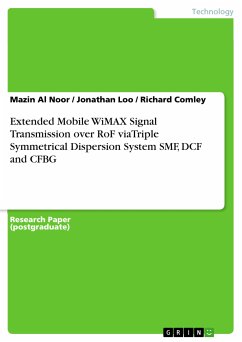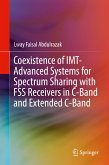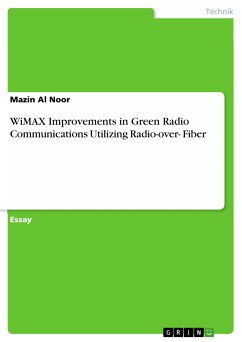Research Paper (postgraduate) from the year 2011 in the subject Engineering - Communication Technology, ( Middlesex University in London ) (School of Engineering and Information Sciences), course: Communications Engineering, language: English, abstract: The main impediments for long distance signal transmission in the fibre optic system, especially the radio over fibre (RoF) system, are the chromatic dispersion and signal power attenuation. Additionally, the power consumption in the laser diode and optical amplifiers affect the signal transmission costs; however, it is lower than in a wireless system. Therefore, decreasing the power consumption and chromatic dispersion and increasing the data bit rate in RoF are the demands for present and future fibre optic system technology. In order to increase the signal transmission distance and improve the frequency spectrum, we study in this paper a mobile Worldwide Interoperability for Microwave Access (WiMAX) signal transmission over RoF via a triple symmetrical dispersion system. The combination of three different fibres - single mode fibre (SMF), dispersion compensating fibre (DCF) and chirped fibre Bragg grating (CFBG) - is used to transmit a 120Mbps mobile WiMAX scalable Orthogonal Frequency Division Multiple Access (OFDMA) signal with 3.5GHz carrier frequency and 20MHz bandwidth over a RoF system. To compensate the dispersion, the SMF and DCF are employed and specifically the high reflector CFBG is applied to reduce signal power loss. In our study, the WIMAX signal is transmitted through a triple symmetrical dispersion system consisting of 2xDCF (20 km) and 2xSMF (100 km) connected to SMF (24 km) and CFBG. Simulation results clearly indicate that the limited signal transmission length and data bit rate in the RoF system, caused by fibre attenuation and chromatic dispersion, can be overcome by the combination of SMF, DCF and CFBG. The transmission distance in the fibre is extended to 792 Km, SNR and OSNR are highly satisfactory; simultaneously the power consumption is decreased.
Dieser Download kann aus rechtlichen Gründen nur mit Rechnungsadresse in A, B, BG, CY, CZ, D, DK, EW, E, FIN, F, GR, HR, H, IRL, I, LT, L, LR, M, NL, PL, P, R, S, SLO, SK ausgeliefert werden.









